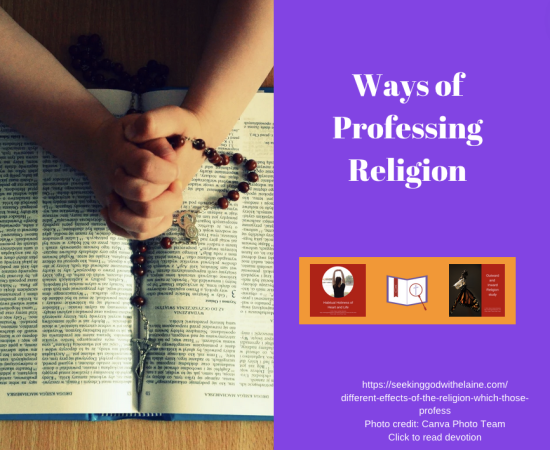We are to make a genuine profession of faith to God. This devotional reading looks at how we are to walk with God.
Nuggets
- Our business is to walk with God.
- Walking with God by following His laws and commandments after accepting His grace brings us inward religion.
- Our walk with God must be genuine.

We’ve been looking at Boston’s sermon on inward and outward religion. Yeah, I’ve kept using the word religion, although I think we are shooting for relationship rather than ceremonial religion.
Boston started calling it a business. He wrote, “Some make religion their main business (Genesis 5:24). And this makes an inside Christian (Psalm 119:6). Others make religion but a bye-work; their main business is of another kind. In regard to the one, all things else about him bow to his religion; whereas, as to the other, he makes his religion bow to his other designs.”
Resource
We are working out our salvation to make sure our relationship with God is an inward religion, not outward.
Let's Put It into Context
To read devotions in the Habitual Holiness of Heart and Life theme, click the button below.
Here is a running list of nuggets for the theme.
Devotions in the Outward and Inward Religion study
Here is a running list of nuggets for the study.
We are using Boston’s sermon as the foundation for this series.
Resource
Making It the Main Business
“Enoch walked with God, and he was not, for God took him” (Gen. 5: 24 ESV)
Our business is to walk with God.
We say that we take care of business. It means that we do what we are supposed to be doing.
What we are supposed to be doing is walking with God. Walking with God means we are humble, reverent, teachable servants of God.
Why do we do that? Gilfillan explained. He wrote, “These words seem to imply that Enoch possessed a remarkable resemblance to God in moral excellence; that he realized God’s presence, and enjoyed His communion in an extraordinary measure, and that he publicly avowed himself to be on God’s side.”
Resource
How do we do that? That is the purpose of sanctification. Sanctification is the transformational process of the mind, body, and soul, which begins with regeneration; gradually changes our nature and morals through the promptings of the Holy Spirit; and ends with perfected state of spiritual wholeness or completeness.
- Regeneration is being changed from spiritually dead to spiritually alive and the internal new birth and requickening that God brings about through the work of the Holy Spirit to give us new character.
- Spiritual death is the separation from God that occurred as a consequence of Adam and Eve’s original sin.
- The spiritually alive are those who have ABCDed, so they are no longer separated from God.
- Spiritual death is the separation from God that occurred as a consequence of Adam and Eve’s original sin.
- Perfection means we reach a state of maturity because the combination of the spiritual graces form, when all are present, spiritual wholeness or completeness — holy, sanctified, and righteous.
- Spiritual graces are worldly morals that have been submitted to God to further His kingdom instead of enhancing this world.
- Sanctified means to be set free from sin.
- Righteous means we are free from sin because we are following God’s moral laws.
Glossary
The ABCDs of Salvation
If you have not become a believer in Christ, please read through the
Plan of Salvation and prayerfully consider what God is asking you to do.
A – admit our sins
B – believe His Son Jesus is our Redeemer
C – confess God as Sovereign Lord
D – demonstrate that commitment by making any changes needed in our lives to live the way in which God has called us
The Disciple’s Job Description
Sanctification changes us from our sinful nature to God’s nature.
Gilfillan described Enoch’s walk with God as quiet and unconsciousness. I agree with the quiet. I don’t agree with the unconsciousness part.
Psalm 40: 10 says, “He says, ‘Be still, and know that I am God; I will be exalted among the nations, I will be exalted in the earth’” (ESV).
It is the know part of that verse that — for me — kicks out the unconsciousness part. God wants us to consciously make a choice to follow Him.
Walking with God depends on persistence, determination, and progress. Many times in God’s Word, we are told to endure to the end. “But the one who endures to the end will be saved” (Mt. 24: 13 ESV). We can only get there through determination and progress.
Is it those who don’t persist who are the Matthew 7: 21 people? It would make sense.
They are not progressing to have God’s character. We must have God’s character to enter Heaven.
Making an Inside Christian
“Then I shall not be put to shame, having my eyes fixed on all your commandments.” (Ps. 119: 6 ESV)
Walking with God by following His laws and commandments after accepting His grace brings us inward religion.
So, what is it — grace or law?
Well, we really need both. Grace is needed for salvation. Keeping the laws and commandments are needed for sanctification.
Grace is a free and unmerited gift of love from the Heavenly Father, given through His Son, Jesus Christ, that enables salvation and spiritual healing to believers by the work of the Holy Spirit.
Salvation is the gift of life through the deliverance from condemnation and sin to acceptance and holiness and changes us from being spiritually dead to spiritually alive.
- Sin is not believing that Jesus is our Savior to save us from our actions by humans that disobey God and break one of His reasonable, holy, and righteous laws and commandments, goes against a purpose He has for us, or follows Satan’s promptings.
- Holy means to be set apart — because of our devotion to God — to become perfect, and morally pure while possessing all virtues and to serve and worship God.
- Pure means not being sinful or having the stain of sin.
- Virtues are standards of moral excellence.
- Holy means to be set apart — because of our devotion to God — to become perfect, and morally pure while possessing all virtues and to serve and worship God.
- Holiness is the transcendent excellence of His nature that includes elements of purity, dedication, and commitment that lead to being set apart.
- Purity means possessing God’s moral character, having eliminated the stain of sin
Glossary
Why is keeping the laws and commandments so important? That is how we learn what God’s character is.
Spurgeon said what I’ve been saying for a long time. He wrote, “Not picking and choosing — paying attention to this, because it pleases me, and omitting that, because it is not equally pleasurable. What do we mean by having respect to all God’s commandment[?] I reply that, whatever there is that the Lord has spoken in any part of His Word we desire to hold in devout esteem, and to have respect to every utterance of His will.”
Resource
We can’t rewrite God Word to reflect our opinions. The laws and commandments must reflect God’s character.
As sin is removed, so, too, is our shame removed. (I would add so is our guilt removed.)
It is logical that shame is removed when sin is. We didn’t feel shame until we sinned. “And they heard the sound of the Lord God walking in the garden in the cool of the day, and the man and his wife hid themselves from the presence of the Lord God among the trees of the garden” (Gen. 3: 8 ESV).
Following God’s laws and commandments gives us peace of mind and a clear conscience. It gives us hope and confidence that we are progressing in having His character.
That means we won’t be Matthew 7: 21 people.
Making Religion a Bye-Work
“If anyone thinks he is religious and does not bridle his tongue but deceives his heart, this person’s religion is worthless” (Jas. 1: 26 ESV)
Our walk with God must be genuine.
In today’s vernacular, we would say byword instead of bye work. It is an example or description of characteristics or principles.
However, many times, it has a negative connotation. It is a bad example.
We don’t want to have a false, worthless religion. We don’t want to have a ritualistic worship.
We want a thriving relationship with God.
Thomas told us what James is talking about here. He wrote, “The word ‘religious,’ here, does not mean the entire religious life — the inner experience and the outward manifestation of religion — but only the outward expression of it. It is the branches and fruit of religion; not its root — that without which the root would be useless, but which is itself dependent upon the root for its very existence. It is the body of religion; not the soul — yet the body by which the soul acts. It is — to use a now commonly repeated word — the ritual of religion.”
Resource
Let’s pick that apart.
- Our relationship with God has an inward and outward aspect. We can’t have one and not the other.
- The inward aspects dictate the outward aspect, not the other way around.
- We have to show the fruit of our relationship with God through outward manifestation.
What is the purpose of these rituals? It helps us put the workings of our hearts into action.

Making the Connections #1
What this all tells me is our relationship has to be genuine. We have to truly walk with God all our days.
Thomas told us how to be genuine. He wrote, “This is the ritual we care to preach, and long to revive; the ritual of pure morality; not the morality of worldly maxims, or human standards; but the morality that springs from love to Christ, and is possible only through faith in Him.”
Resource
Morality, morality, morality. We are genuine in our morality.
Making the Connections #2
What does all this have to do with Matthew 7: 21 being goats and vice versa?
Maclaren had an interesting quote that reminds us about not being a genuine Christian. He wrote, “A man has no business to call himself a Christian unless the virtues of Christianity are in his life. I do not ask for degree, but I ask that they shall be there.”
Resource
Virtues. Morals. Spiritual graces. We are not Christians if we do not possess all of them.
How Do We Apply This?
- Walk with God.
Father God. We want to walk with You. We want You to teach us Your laws and commandments so that we can have Your character through our submission to them. Sanctify us to do Your Will. Amen.
What do you think?
Leave me a comment below (about this or anything else) or head over to my Facebook group for some interactive discussion.
If you don’t understand something and would like further clarification, please contact me.
If you have not signed up for the email providing the link to the devotions and the newsletter, do so below.
If God has used this devotion to speak with you, consider sharing it on social media.